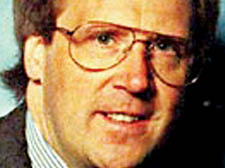| |

Philip Lawrence |
GCSE triumph for troubled school
Headteacher credited with turnaround says focusing on discipline was the key
TEACHERS and pupils at the Maida Vale school where Philip Lawrence was killed in 1995 are crediting their new headteacher for its improving standards.
Father of four Mr Lawrence was stabbed to death by Learco Chindamo – a student at another school – while he was trying to protect a 13-year-old pupil.
Ofsted inspectors declared the school to be “failing” in 2000 and the school was temporarily shut down after a spate of violent incidents.
But yesterday (Thursday) St George’s was celebrating a 12 per cent increase on its 32 per cent A-C pass rate achieved last year.
Headteacher Martin Tissot paid tribute to Mr Lawrence, describing him as “a hero”.
He said that the key to improving schools is to focus on discipline and to raise teaching standards not to invest in metal detectors or stab-proof uniforms.
He said: “If you look at the statistics on the number of children that get stabbed you’ll see it’s very low. I’m sure that some parents might buy stab-resistant jackets but I never want to see this happen at St George’s. It’s a friendly place. It is not a place where there is any violence.”
Mr Tissot has introduced a number of new measures which includes the reciting of prayers before the start of every lesson.
Geography teacher Andrew Wheeler believes the new emphasis on religion has helped students to focus on their studies and learn to respect one another.
He said: “Many of the students go to church on the weekends and what Martin has done is bring that part of their lives more to the forefront of the school because it’s part of their life. In the last year we have said prayer at the start of every lesson.
“It gives the students a chance to calm down and realise they’re in a place to learn. You can see the change in the children in that they respect each other a little more.”
Andrew Mace, history teacher, credits the use of Saturday morning detentions for the better standards of discipline at the school and after-school revision clubs for its improved grades.
He said: “It makes them feel safer knowing that if someone does something bad it’s not just going to disappear. That really cuts down on minor violence which could escalate.”
Essen Tuncua, 16, who achieved five A* and five A-grade GCSEs this week said: “There have been plenty of after-school revision classes to attend and the teachers have always been really helpful with marking extra work I did outside lessons.”
Lawrence Campbell, 16, who received six Bs and three Cs, added: “If you want to get on, work hard. If you want to muck about and be the ‘cool’ kid then, well, just mess around.”
• Overall, Westminster schools’ average GCSE A*-C grades was up 4.5 per cent on last year. |
 |
|
| |
| |